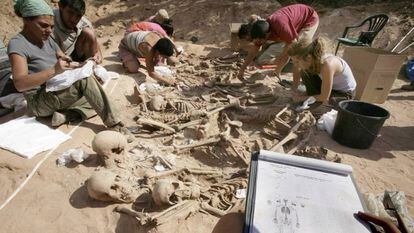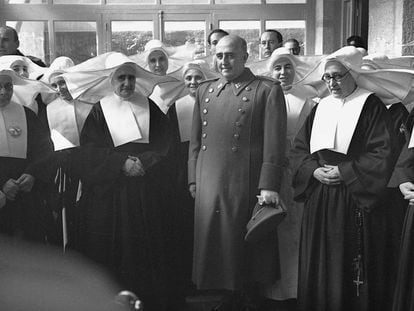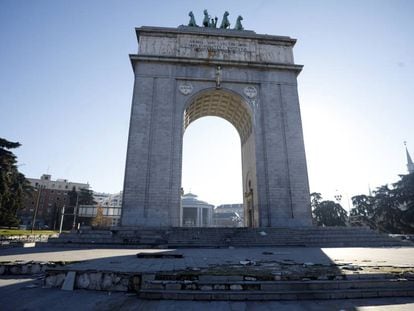Spanish government to spearhead efforts to find Civil War victims
Socialist Party administration says the search for mass graves can no longer be left to private associations


Spain’s Justice Minister Dolores Delgado on Wednesday announced that the government will spearhead the search for people who went missing under the regime of Spanish dictator Francisco Franco, and whose bodies are still lying in mass graves and by roadsides. Until now, this recovery effort had been a private initiative led by relatives and volunteers.
The Socialist Party (PSOE) government will also create an official census of victims of the Civil War (1936-1939) and the subsequent dictatorship, which ended with Franco’s death in 1975.
Privatizing the exhumations was a policy that was doomed to have poor results
Pablo de Greiff, ex-UN Rapporteur
The Pedro Sánchez administration additionally wants to reform existing historical memory legislation to cancel rulings that were handed down by Francoist courts, and to create a truth commission. Officials are also considering outlawing associations that “glorify Francoism,” such as the Franco Foundation.
“It is not acceptable that people who are over 90 years old are in despair thinking that they will never recover their parents’ remains, or are faced with a ‘no’ from a judge or an arbitrary decision made by a local government,” said Minister Dolores Delgado on Wednesday in Congress. “It is unacceptable for Spain to continue to be the second country after Cambodia with the largest number of missing people.”
There are still more than 1,200 mass graves left to open in Spain, according to a map available at the Justice Ministry.
During the administration of PSOE Prime Minister José Luis Rodríguez Zapatero, which passed the Historical Memory Law in 2007, the executive gave grants to victims’ associations to help fund their search for mass graves with help from hired professionals. When Mariano Rajoy of the Popular Party (PP) came to power, this funding was slashed and the graves were opened thanks to donations from Norwegian electricians’ unions, prize money from the United States, and orders issued by courts in Argentina, 10,000 kilometers from the scene of the crimes.
Franco Foundation
The Spanish government is also considering ways of outlawing “associations or organizations that glorify Francoism.” The National Francisco Franco Foundation, which lays fresh flowers on the dictator’s grave every day of the year, keeps archival material and publishes online articles praising Franco and minimizing the harsh repression that followed the war, and which the historian Paul Preston has described as “the Spanish Holocaust.” One of the options is to include “glorifying Francoism” in the criminal code, and another is to amend existing association and foundation laws. The Franco Foundation has not received state funds for years, but its members get tax breaks.
The new PSOE administration now wants to lead all the steps of the process through a newly created agency that will answer to the Justice Ministry. Authorities said they will draft a national plan to locate missing persons and will enlist experts in the fields of archeology, law and forensic medicine, as well as representatives from victims’ associations.
As for the victim census, it will be Spain’s first. Until then, the closest thing continues to be a list drawn up by former investigating Judge Baltasar Garzón, who began probing Franco-era crimes before being disbarred for 11 years in 2012.
At her congressional appearance, Minister Delgado mentioned a “damning” report by the United Nations rapporteur Pablo de Greiff, who visited Spain in 2014 and lamented that Franco’s victims were being ignored by the Spanish state.
“I think this is wonderful news,” said De Greiff, who left his UN position a month ago. “Privatizing the exhumations was a policy that was doomed to have poor results. These are difficult processes: Argentina and Chile have achieved great things, but 30 years later than they thought. This should be a state policy, it benefits everyone.”
English version by Susana Urra.












































